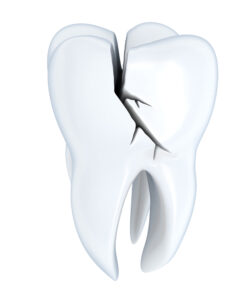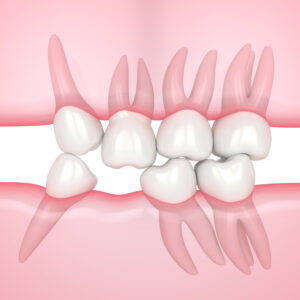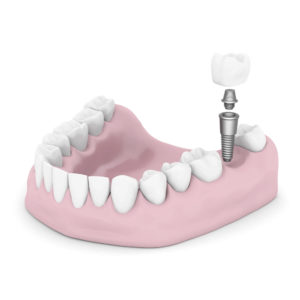Consequences of Tooth Loss
If you think losing a tooth is no big deal, you are wrong. Unless you are a 12 year old losing your eighteenth baby tooth, it IS a big deal. Specifically, losing a permanent tooth is a big deal, and it has some serious consequences.
The great news is that every one of these consequences is preventable. You can prevent them from happening even if you don’t have a choice in extracting a tooth because you can replace the missing tooth with a dental implant.
Cracked Teeth
 The design of teeth allows them to bear a specific amount of force under chewing. Our jaws can generate on average 300 psi of pressure, which all goes straight to the food between our teeth to grind it as the essential first step in digestion. The problem is that when we lose a tooth, the jaws still generate the same amount of force, and there are now fewer teeth to bear that force. That means each tooth receives more force than that for which its design intends. The teeth that bear the brunt of this increased force are the neighbors to the missing tooth.
The design of teeth allows them to bear a specific amount of force under chewing. Our jaws can generate on average 300 psi of pressure, which all goes straight to the food between our teeth to grind it as the essential first step in digestion. The problem is that when we lose a tooth, the jaws still generate the same amount of force, and there are now fewer teeth to bear that force. That means each tooth receives more force than that for which its design intends. The teeth that bear the brunt of this increased force are the neighbors to the missing tooth.
We commonly see patients opting to extract a second molar since it is the furthest back tooth. The adjacent first molar then has a high risk for cracking and requiring expensive dental treatment on it.
Gum Recession
Like cracked teeth, gum recession is most likely on the teeth neighboring the extracted tooth. Without the pressure of an adjacent tooth holding the gums up against the side of its neighbor, gums slowly drop away from the tooth. The increased bite force adds to the effect of gum recession.
This is a serious consequence because lost gum tissue is very difficult to replace. Even after replacing the missing tooth with a dental implant, the gums tend to maintain their receded position.
Bone Loss
There is bone loss that occurs underneath the receding gums, but that’s actually not the type of bone loss we refer to in this section. We are talking about the natural loss of bone that occurs when you lose a tooth. The jawbone’s only purpose is to surround and support teeth. When a tooth is no longer present, the bone in that specific site begins to shrink.
This shrinkage occurs slowly over time, and eventually, it can prevent your ability to replace the tooth with a dental implant. It shrinks first horizontally, transitioning into a narrow ridge of bone. Then it shrinks vertically, forming a deep concavity where the missing tooth was.
Shifting Teeth
 Many people mistakenly think that teeth naturally stay in place, when actually they are constantly shifting and moving in microscopic increments. It is the pressure of both neighboring teeth and opposing teeth (that bite against each other) that maintains a tooth’s position.
Many people mistakenly think that teeth naturally stay in place, when actually they are constantly shifting and moving in microscopic increments. It is the pressure of both neighboring teeth and opposing teeth (that bite against each other) that maintains a tooth’s position.
This means that when you lose a tooth, the teeth on both sides of the space are likely to drift into the opening. The tooth that bites against it may also drift into the space. This is more likely when the missing tooth is in the lower jaw, and the upper opposing tooth drifts downward.
All of this shifting may cause small gaps to open between other teeth, annoyingly allowing food to collect during meals.
Bite Problems
Those shifts aren’t just annoying. They can lead to changes in the way the upper and lower jaw bite together. Bite changes create a completely new category of problems, including teeth clenching and/or grinding, sensitive teeth, cracked teeth, and TMJ disorder.
The good news is that these bite changes can be corrected through orthodontic treatment, and the better news is that you can prevent them by replacing the missing tooth as soon as possible. The bad news is that correcting these bite changes can be expensive and take months to years of treatment.
Digestive Problems
When you lose a tooth, you also lose a certain amount of surface area for chewing and grinding your food. Especially with multiple missing teeth, the lost surface area reduces the effectiveness of chewing.
Chewing your food properly is the first step in the digestive process. Chewing physically breaks food down into smaller particles, exposing it to enzymes in saliva. People who are missing multiple teeth end up swallowing larger particles of food and placing themselves at risk for digestive problems and nutritional deficiencies from unabsorbed nutrients.
Cosmetic Problems
It is easy to understand the cosmetic problem that occurs when you are missing a tooth in a visible area of the mouth. But did you know that missing back teeth can affect your appearance, too?
Even a single missing tooth can lead to a “sunken in” appearance to that area of the face. People missing multiple back teeth actually lose facial height. Without teeth to set the vertical height of the jaws, the upper and lower jawbones move closer together. This causes a shortened facial height, which leads to more wrinkles and a much older appearance to the face. This occurs even when you have all of your front teeth!
How Does a Dental Implant Prevent These Consequences?
 There are several different ways you can replace a missing tooth. The problem is that most of them rely on the support of the neighboring teeth, which actually increases the problems you could experience because of the lost tooth.
There are several different ways you can replace a missing tooth. The problem is that most of them rely on the support of the neighboring teeth, which actually increases the problems you could experience because of the lost tooth.
A dental implant is the only tooth replacement option that stands alone. By anchoring into the jawbone, it does not add any pressure to the neighboring teeth, and it receives all of its support from the bone itself, just as a natural tooth does. Dental implants provide the only preservation of jawbone in the site, and the crown covering them prevents any movement of the surrounding teeth. With a dental implant, you can chew as well as, if not better than, you could before losing the tooth. There is no question that implants provide the most effective chewing.
More Questions about Losing Teeth?
Call Designer Smiles today to schedule a consultation visit with Dr. Ann. She is an expert in removing hopeless teeth and replacing them with dental implants. She can discuss all of your treatment options with you and help you decide which one will best meet your specific goals.
